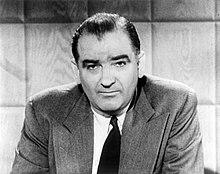Joseph McCarthy
| Joseph McCarthy | |
|---|---|
 |
|
|
United States Senator from Wisconsin |
|
|
In office January 3, 1947 – May 2, 1957 |
|
| Preceded by | Robert M. La Follette Jr. |
| Succeeded by | William Proxmire |
| Personal details | |
| Born |
Joseph Raymond McCarthy November 14, 1908 Grand Chute, Wisconsin, U.S. |
| Died | May 2, 1957 (aged 48) Bethesda, Maryland, U.S. |
| Resting place |
Saint Mary's Cemetery Appleton, Wisconsin, U.S. |
| Political party | Republican (1944–1957) |
| Other political affiliations |
Democratic (c. 1936–1944) |
| Spouse(s) | Jean Fraser Kerr Minetti (m. 1953) |
| Children | Tierney Elizabeth McCarthy |
| Alma mater |
University of Wisconsin Marquette University Law School (LL.B.) |
| Profession | Attorney, judge, politician |
| Committees | Senate Committee on Government Operations |
| Portfolio | Chairman for federal investigations of Communists in the U.S. government |
| Religion | Roman Catholicism |
| Awards | Distinguished Flying Cross |
| Signature |  |
| Military service | |
| Nickname(s) | Tail-Gunner Joe |
| Allegiance |
|
| Service/branch |
|
| Years of service | 1942–45 |
| Rank |
|
| Battles/wars | World War II |
Joseph Raymond "Joe" McCarthy (November 14, 1908 – May 2, 1957) was an American politician who was a U.S. Senator from the state of Wisconsin from 1947 until his death in 1957. Beginning in 1950, McCarthy became the most visible public face of a period in which Cold War tensions fueled fears of widespread Communist subversion. He was noted for alleging large numbers of Communists and Soviet spies and sympathizers inside the federal government and elsewhere. Ultimately, the controversy he generated led him to be censured by the US Senate. The term "McCarthyism", coined in 1950 in reference to McCarthy's practices, was soon applied to similar anti-communist activities. Today, the term is used in reference to what are considered demagogic, reckless, and unsubstantiated accusations, as well as public attacks on the character or patriotism of political opponents.
Born in Grand Chute, Wisconsin, McCarthy enlisted in the Marine Corps in 1942, where he served as an intelligence briefing officer for a dive bomber squadron. Following the end of World War II, he attained the rank of major. He volunteered to fly twelve combat missions as a gunner-observer, acquiring (or perhaps giving himself) the nickname "Tail-Gunner Joe". Some of his claims of heroism were later shown to be exaggerated or falsified, leading many of his critics to use "Tail-Gunner Joe" as a term of mockery.
McCarthy successfully ran for the US Senate in 1946, defeating Robert M. La Follette Jr. After three largely undistinguished years in the Senate, McCarthy rose suddenly to national fame in February 1950 when he asserted in a speech that he had a list of "members of the Communist Party and members of a spy ring" who were employed in the State Department. In succeeding years after his 1950 speech, McCarthy made additional accusations of Communist infiltration into the State Department, the administration of President Harry S. Truman, the Voice of America, and the US Army. He also used various charges of communism, communist sympathies, disloyalty, or sex crimes to attack a number of politicians and other individuals inside and outside of government. This included a concurrent "Lavender Scare" against suspected homosexuals (while homosexuality was against the law at the time, it was also considered a liability for blackmail).
...
Wikipedia
